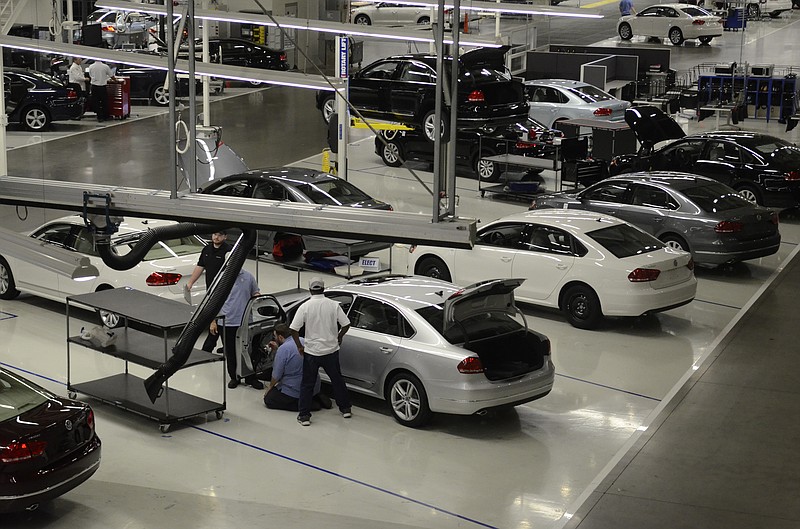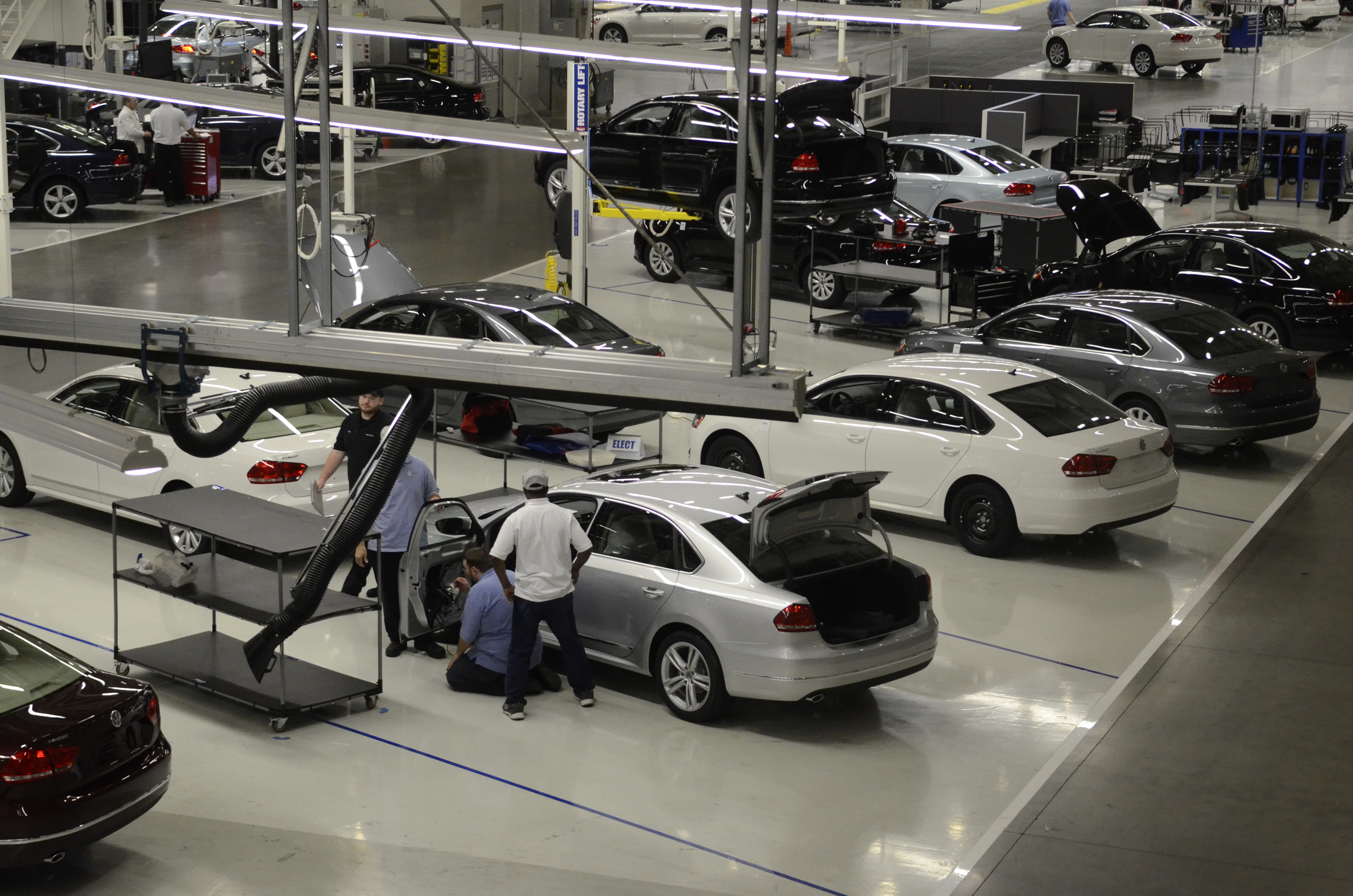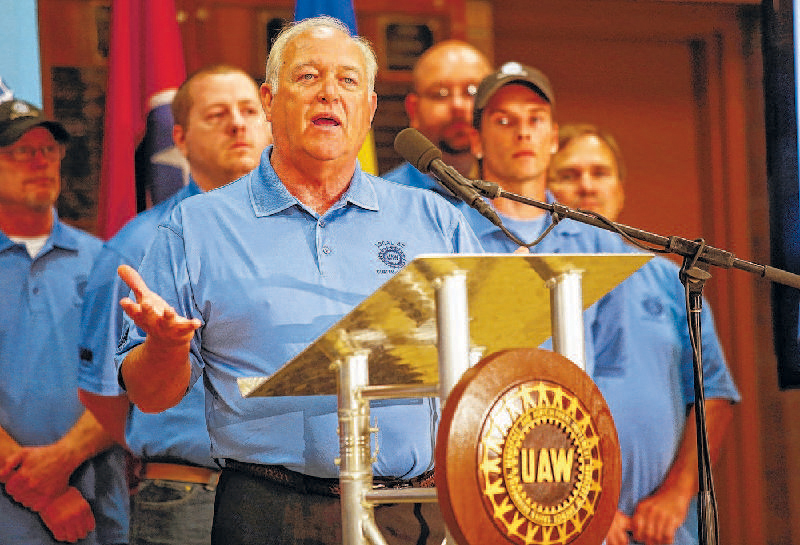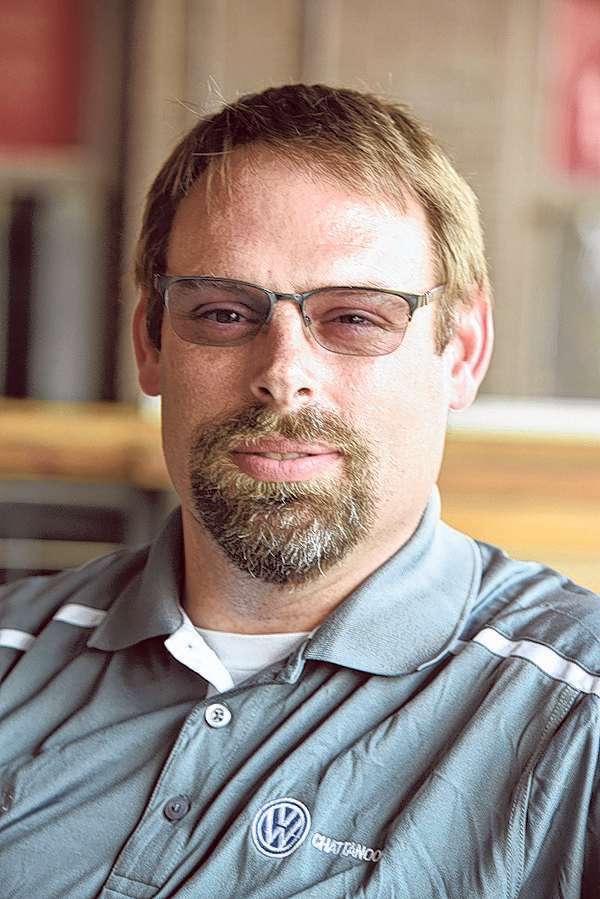VW policy
Volkswagen’s community engagement policy in Chattanooga was put into place last year. Labor group dialogue with the company is based on an organization’s membership level:› More than 15 percent membership: Permits reserving space in the conference center for internal employee meetings on non-work time once per month; post announcements and information in company designated locations; meet monthly with VW human resources officials› More than 30 percent membership: In addition to 15 percent level opportunities, invite external representatives of the organization for meetings once a month; post materials on a dedicated board; meet quarterly with a member of the VW Chattanooga executive committee› More than 45 percent membership: In addition to 30 percent level opportunities, reserve on-site locations for meetings as reasonably needed; meet bi-weekly with VW human resources and monthly with executive committee
Unions in metro Chattanooga
The share of union workers last year was 6 percent, less than half the U.S. rate of 12.3 percent. More than 70 percent of union members in our six-county metropolitan area work for the government, which has a union participation rate nearly six times higher than the private sector.› 17,379 employees are union members — 6 percent of all workers› 5,131 private sector workers are union members — 2.8 percent of the private workforce› 12,249 government workers are union members — 35.1 percent of the public sector workforceSource: Unionstats.comPercentage of union workers in metro Chattanooga2014 - 6 percent2013 - 4.8 percent2012 - 5.9 percent2011 - 5.5 percent2010 - 6.0 percent2009 - 3.5 percent2008 - 4.1 percent2007 - 5.5 percent2006 - 8.6 percent2005 - 7.6 percent2004 - 6.1 percent2003 - 5.4 percent2002 - 7.1 percent2001 - 7.4 percent2000 - 10.0 percent1999 - 9.9 percent1998 - 11.4 percent1997 - 11.7 percent1996 - 10.6 percent1995 - 12.0 percent1994 - 10.1 percent1993 - 15.4 percent1992 - 22.7 percent1991 - 17.1 percent1990 - 19.0 percent1989 - 14.6 percent1988 - 12.6 percent1987 - 15.1 percent1986 - 12.4 percentSource: Unionfacts.com
Two competing labor groups continue in a tug of war for the hearts and minds of Volkswagen employees in Chattanooga, and the leaders of each union are confident they'll ultimately reach their goals.
But as workers mark Labor Day on Monday, a former National Labor Relations Board member says there's no clear view of what the future holds at the plant.
"It seems like a stand off," said Dr. John Raudabaugh, who is a law professor at Ave Maria School of Law in Naples, Fla.
The United Auto Workers, Local 42, and the American Council of Employees each are operating under a policy set up by VW that provides partial recognition and certain rights to meet with management.
Mike Cantrell, the UAW local's president, said the group recently turned in a new list of members to VW, which the automaker is to verify. He expects to again achieve the highest level of engagement with the company under the policy.
"We feel good about it," he said.
Cantrell said the local has a majority of the assembly workers as members, but he wouldn't provide a figure.
"We know we still have a majority, no doubt," Cantrell said last week, adding the local is in "great shape" if VW verifies the number of workers it submitted.
David Reed, ACE's new president, said it's readying to seek re-certification from VW under its policy.
"We're confident as we were before," he said.
Reed said ACE is growing, though he declined to give a membership number.
"We're the local voice," he said. "It's local employees making decisions."
In February 2014, the UAW lost an organizing vote among the plant's workers by 712 to 626.
The UAW has said it represents about 55 percent of the blue-collar workforce at the German assembly plant. Late last year it met the level of support that for the first time enabled it to start biweekly face-to-face meetings with VW officials at the factory and other privileges.
In an April filing, the UAW Local 42 said it had 816 members among the hourly workers at VW in Chattanooga. By signing up at least 45 percent of the plant's rank-and-file workforce, that gave the UAW its strongest foothold yet in the Chattanooga plant.
But last February, the anti-UAW group ACE also qualified for limited organizing rights at the factory by gaining at least 15 percent of the hourly plant workers. ACE said this spring it had 381 members among both hourly and salaried workers at the Chattanooga factory.
ACE gained similar rights as the UAW at the plant, though not as extensive. Those include convening monthly with human resources officials, holding regular on-site meetings and posting announcements at the factory.
Both groups have submitted plans to VW for setting up a works council at the plant, which VW has in nearly all its plants worldwide. Experts say that under U.S. law, a union is needed to set up such a panel.
Works councils, which can include both blue- and white-collar employees, deal with working conditions inside the plant and not with issues such as pay and benefits.
Cantrell said the UAW local's goal is to achieve collective bargaining with the company.
"Without a doubt," he said.
He previously said he wants VW to recognize the union by checking its membership cards rather than holding another employee election. But he now adds that "everything is on the table," including another election.
"We're getting closer and closer to a resolution in some way," he said. "All the options are open."
Reed said there should be another election.
"Definitely. If there is going to be recognition there should be a vote," he said.
Reed has said ACE is focused on achieving a works council at the plant, and that VW officials are "very happy" with the plan it has submitted and with the dialogue with the union.
He said that VW is in no apparent hurry.
"We've got a great dialogue," Reed said. "We're working hand in hand with them."
VW spokesman Scott Wilson said its community engagement policy has allowed the company to have regular and productive meetings with the employee groups.
"We look forward to continuing with this policy, as we are very pleased with the conversations taking place," he said.
Raudabaugh said that if the UAW has 30 percent or more of the rank-and-file signed up, it could petition for an election. But, if a vote is conducted, the UAW would have to gain 50 percent plus one of the VW workers' ballots, he said.
The other option is that the UAW could go to the employer and seek recognition. If the UAW has a majority of signed cards, the company could voluntarily recognize the union.
Raudabaugh, a former NLRB member under President George H.W. Bush, said that since none of this has happened, "it tells me they're not confident they truly have a majority."
For VW, Raudabaugh said, he thinks the company wants to focus on its Chattanooga factory expansion and production rather than on labor issues.
expansion plans despite sales dip
VW brand sales in the U.S. have faltered. Passat sales were down more than 19 percent last month, while total vehicle sales are off 2.7 percent for the year so far.
The company is undertaking a $900 million expansion at the plant to bring a new midsize sport utility vehicle to the market late next year and adding 2,000 employees.
Earlier this summer, the UAW opened negotiations with the Detroit 3 automakers over a new contract, which is seen as key for the union moving ahead.
Raudabaugh believes the union is concentrating now on those talks in more labor-friendly states to the north.
"Everything is focused on the Big 3 negotiations," he said.
The UAW is yet to gain a foothold among the foreign transplants that have located factories in the South, including Nissan, Mercedes Benz, BMW and Volkswagen.
The share of workers represented by labor unions in Chattanooga has fallen in half over the past two decades and remains less than half the U.S. rate, according to unionfacts.com, which tracks local union elections and memberships. Among private sector workers in metropolitan Chattanooga, only 2.8 percent of workers now belong to a labor union, so UAW is recruiting workers in a region where most workers haven't been part of a union in the past.
In addition to Volkswagen, the UAW continues to work at organizing other auto plants in the South which belong to foreign automakers, such as at Mercedes in Vance, Ala., and Nissan, in Canton, Miss.
The UAW is targeting Southern auto plants to help reverse a decades-long decline in membership. Although the UAW has gained members in each of the past five years since the end of the Great Recession, the UAW's membership last year of 403,000 was less than a third of the union's peak of 1.5 million members in 1979.
Contact Mike Pare at mpare@timesfreepress.com or 423-757-6318.



